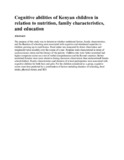Cognitive abilities of Kenyan children in relation to nutrition, family characteristics, and education

View/
Date
1989Author
Sigman, M
Neumann, C
Jansen, AA
Bwibo, NO
Type
ArticleLanguage
enMetadata
Show full item recordAbstract
The purpose of this study was to determine whether nutritional factors, family characteristics, and the duration of schooling were associated with cognitive and attentional capacities in children growing up in rural Kenya. Food intake was measured by direct observation and weighment twice monthly over the course of a year. Families were characterized in terms of socioeconomic status and the literacy of the parents. Children who were better nourished had higher composite scores on a test of verbal comprehension and the Raven's matrices. Better-nourished females were more attentive during classroom observations than malnourished female schoolchildren. Family characteristics and duration of school participation were associated with cognitive abilities for both boys and girls. For the children considered as a group, cognitive scores were best predicted by a combination of factors including duration of schooling, food intake, physical stature, and SES
URI
http://www.ncbi.nlm.nih.gov/pubmed/2515042http://erepository.uonbi.ac.ke:8080/xmlui/handle/123456789/16031
Citation
Child Dev. 1989 Dec;60(6):1463-74.Publisher
Department of Psychiatry, UCLA Medical School 90024 Department of Paediatrics and Child Health, University of Nairobi
Collections
- Faculty of Health Sciences (FHS) [10387]
